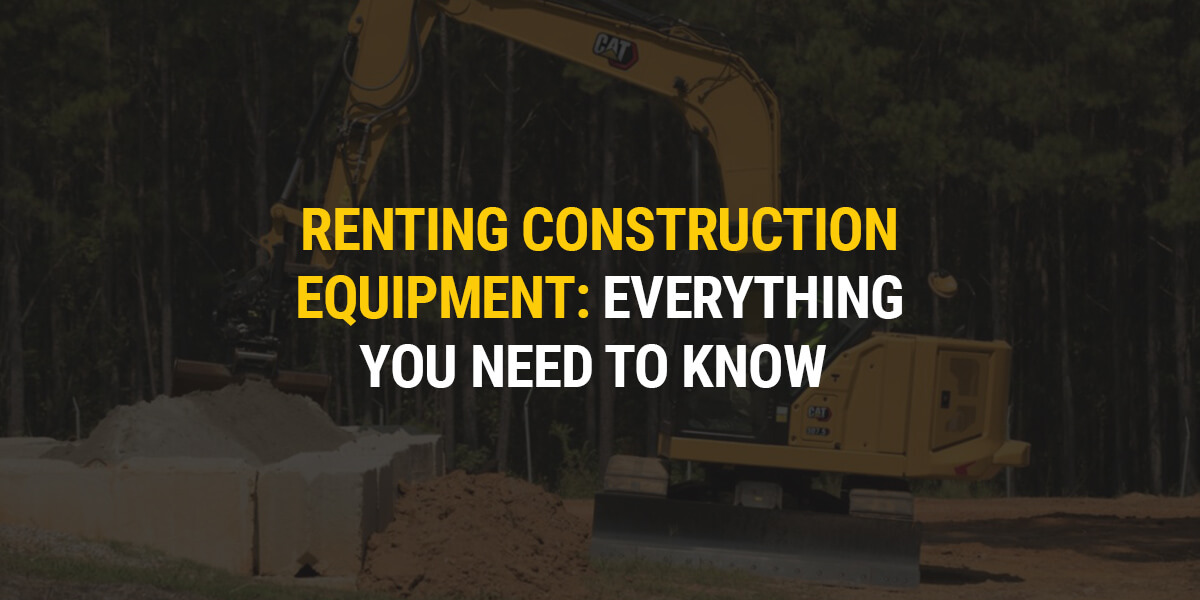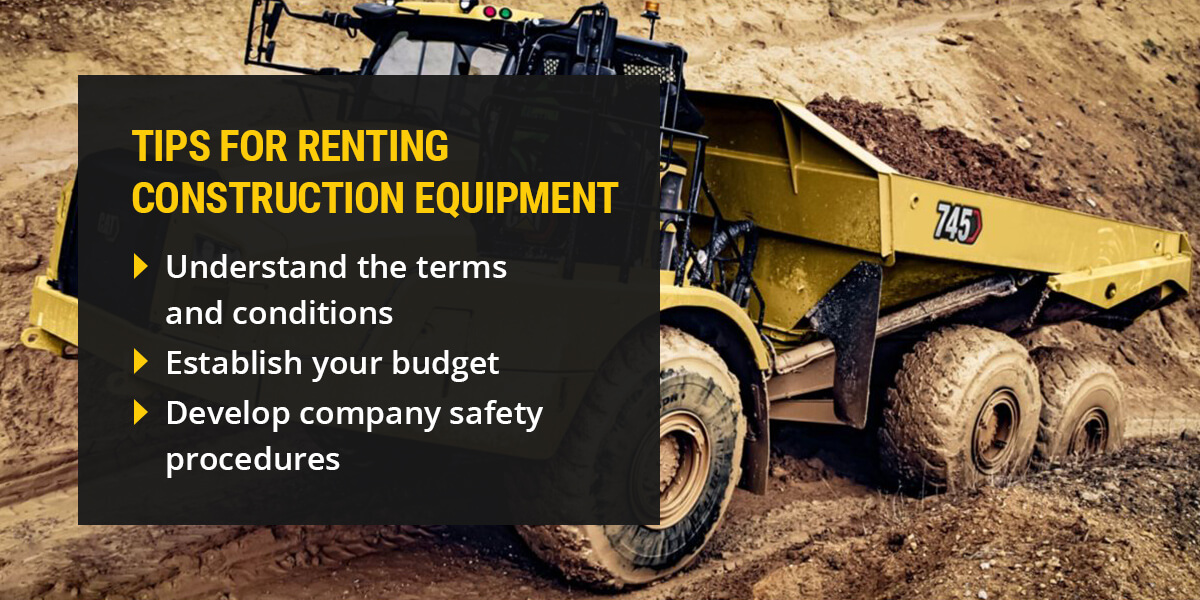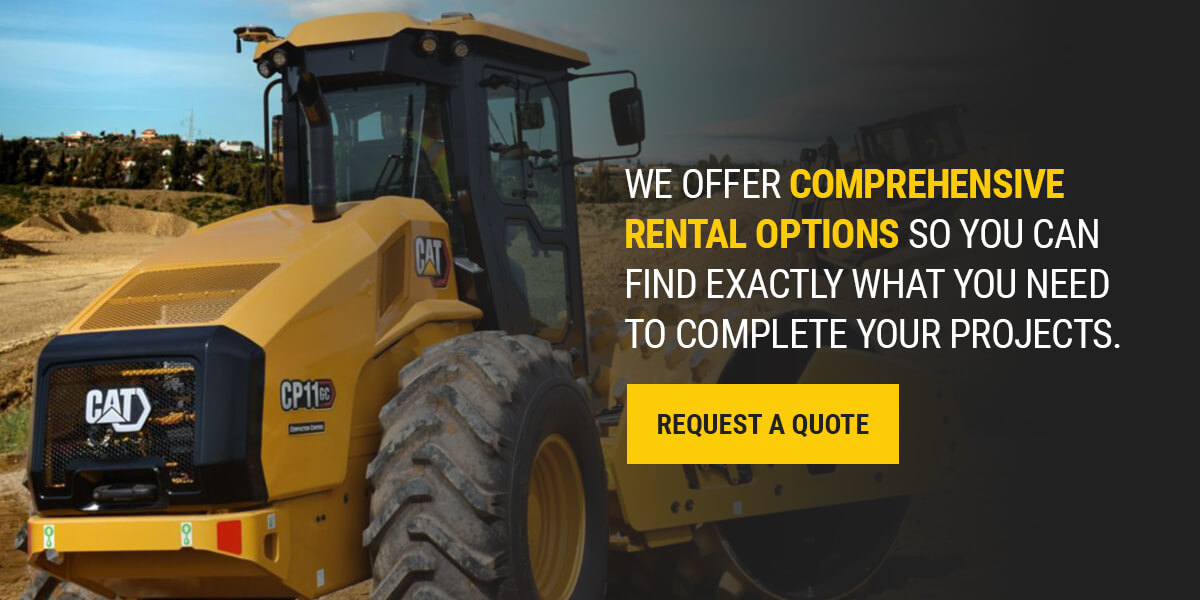When considering implementing new equipment into your construction projects, renting can be an excellent option for many companies. Discover the advantages of renting construction equipment and what factors to consider in the process.
Renting vs. Buying Construction Equipment
Buying equipment involves investing time, money, and care. You are responsible for every aspect of equipment, from storage and transport to maintenance and repairs. At the same time, equipment ownership means you will have access to that model at any time. When you use equipment often, ownership can be cost-effective and efficient.
Renting heavy construction equipment has its own set of advantages. Rental companies issue agreements based on your desired timeline, allowing you to use the equipment for specific projects. Because they own the equipment, these companies handle maintenance, repairs, and storage as well as provide transportation services.
The Benefits of Renting Construction Equipment
Should you rent construction equipment? Understanding the benefits can help you determine if this option is right for your company and customers.
Fit Your Budget
Renting can offer many construction companies the financial flexibility they need to provide the best services. Investing in new equipment comes with many unique costs that you can avoid with renting. Upfront costs for buying are often higher, and you have to pay for ongoing maintenance and repairs. Depending on your model, you may have to pay for expensive fuel regularly.
Rental companies are responsible for many aspects of equipment care, so you don’t have to be. Most will complete comprehensive maintenance processes before and after each rental period to ensure quality and functionality for their clients. In addition, rental agreements adjust pricing based on your timeline and expected fuel use, helping you use equipment with fewer expenses.
Increase Project Range and Capabilities
Equipment rentals are ideal when you want to offer services that your existing equipment can’t provide. A specific project may require a certain function, or you may want to reach a wider audience through increased capabilities. Renting equipment allows you to do more without investing in expensive new equipment that you may only use for one project.
Save on Storage and Transportation
When you own equipment, you must store it between uses. Storage solutions can be expensive, and equipment you use infrequently can make it less cost-effective. Renting eliminates storage needs because you only rent for the exact length of time you require. Moving equipment from sites and storage centers can be costly — many rental companies deliver and pick up equipment, which helps decrease the hassle and overall costs.
Avoid Obsolete Equipment
Renting equipment means increasing your access to newer models and features. Equipment ownership often involves investing money and time in order to update to the latest features, which ultimately reduces efficiency and functionality. When you rent, you can increase on-site efficiency and quality by working with the best equipment available.
How to Compare Rental Options
Finding the right rental company for your construction business can ensure you have all the right tools and resources your operators need to get the job done. Some ways to compare your rental options include:
- Read company and model reviews: Well-established rental companies will have many reviews from past customers. Explore what their clients said they did well or learn about potential pain points. Before renting, you should also research the model you want. Reviews from others can give you an idea of whether this option is suitable for your project.
- Review load and weight ranges: When researching different rental equipment, you can streamline your processes and ensure a better experience by selecting equipment that meets your project specifications. Having the right tools can keep projects moving so you can meet deadlines and time estimates.
- Identify renter resources: By renting, you can take advantage of the additional services offered by rental companies. Many provide delivery or pick up options, so you can spend less on equipment transportation. You might also look for companies that offer operator training as part of the rental package. If this equipment is new to your team, it’s important to ensure safety and efficiency through hands-on training.
Tips for Renting Construction Equipment
As you begin the rental process, here are a few equipment rental tips to keep in mind:
- Understand the terms and conditions: Each rental company will provide a contract with different responsibilities for each party. Reading these carefully and understanding the expectations can help reduce your liability and avoid extra fees, like transportation or fuel costs.
- Establish your budget: Renting equipment is a smart choice, but there are still costs to consider. Setting a clear budget can help you determine what you can invest in and how much you can spend on different services.
- Develop company safety procedures: When working around heavy construction equipment, safety is the top priority. Whether you rent or buy equipment, it’s essential to have company safety procedures and training in place to ensure safety on the job site. You can increase safety by developing and enforcing visible clothing requirements, spotters in tight spaces, and mandatory training before operating.
Factors to Avoid When Renting Construction Equipment
During the equipment rental process, it’s important to keep in mind a few common pitfalls to avoid.
Using the Wrong Equipment Size
When determining the specifications required for your project, consider the ideal size. Larger equipment is excellent for heavier loads and capabilities, but the weight can damage softer surfaces like lawns and uncured asphalt. Heavy equipment also offers less precise movements compared to smaller pieces of equipment that can move and turn around narrow job sites more easily. At the same time, using smaller equipment on a large job site may be inefficient.
Scheduling Incorrectly
Before renting, it’s important to develop an accurate project timeline to determine how long your rental should last. Renting for too long can decrease your return on investment as your equipment sits unused for part of your rental term. On the other hand, you want to make sure you don’t underestimate and end up needing to pay late fees or extend your rental agreement.
Not Checking Equipment Before Use
Upon receiving your equipment, you should always check its features and functions before use to ensure the equipment is ready to go. Rental companies conduct thorough inspections of their equipment, but it’s a good rule of thumb to conduct a visual inspection before putting your equipment to work to ensure safety and functionality.
How to Rent Construction Equipment From Thompson Rents
When searching for construction equipment rental services in Alabama and northwest Florida, turn to Thompson Rents. We offer comprehensive rental options so you can find exactly what you need to complete your projects. We carry equipment from many manufacturers to help companies rent the brands they know and trust. We also offer repair and maintenance services during your rental term as well as delivery and pickup options for a streamlined rental experience.
Request a quote today and discover how renting can benefit your construction company.




